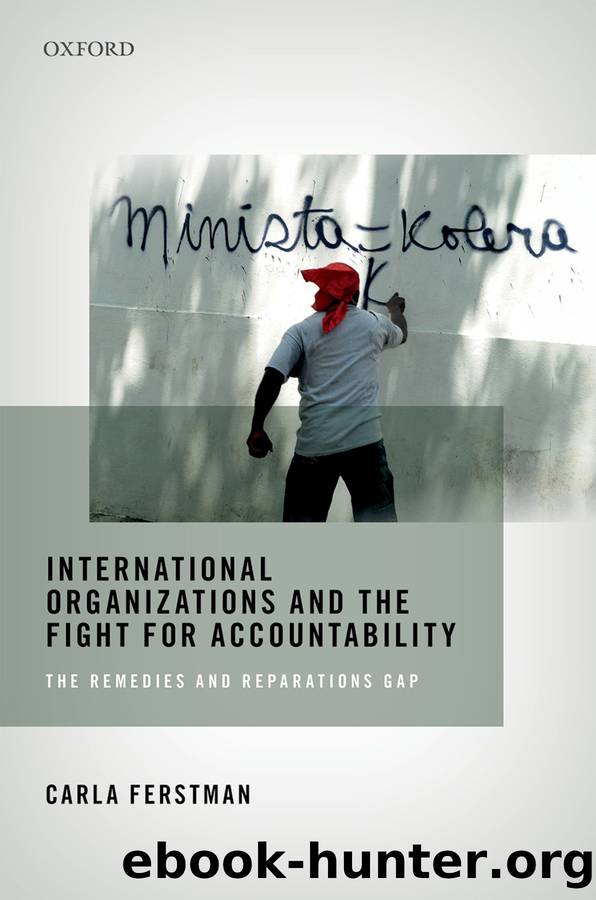International Organizations and the Fight for Accountability by Carla Ferstman

Author:Carla Ferstman [Ferstman, Carla]
Language: eng
Format: epub
Tags: law, Criminal Law, Sentencing, International
ISBN: 9780198808442
Google: j28sDwAAQBAJ
Publisher: Oxford University Press
Published: 2017-11-15T00:28:46.928551+00:00
(7) The characterization of conduct
Consistent with understandings of the immunity from legal process of individual officials, which is limited to conduct performed by them in their official capacity (immunity ratione materiae), ultra vires acts and omissions which may implead the organization will only be attributed to the organization if they are carried out in an official capacity.158 As the DARIO commentaries indicate, this is intended to make clear that actions which took place in a purely private capacity are not attributable to the organization.159 As is set out in Chapter III, the OLA has taken a wide approach to the âoff dutyâ (and thereby non-official) acts of peacekeepers, and a narrow characterization of the ultra vires conduct that is âon dutyâ. Under such readings, the private conduct exception might exempt a wide range of conduct amounting to internationally wrongful acts.
When damages are caused âfrom the necessary actions taken by a peacekeeping force in the course of carrying out its operations in pursuance of its mandateâ, existing UN frameworks specify that the UN incurs no liability.160 Part of the rationale for the exception is that the State receiving the peacekeeping operation should bear the costs of the operation, since the peacekeeping efforts are undertaken at its request or on its behalf. This is misleading because it is highly improbable that the host Government will assume responsibility for an internationally wrongful act attributable to the organization, given the absence of a legal obligation to do so, the exigencies of the conflict or immediate post-conflict context as well as the absence of means to oblige enforcement. As Prescott has noted, the denial of these claims âwill disproportionately impact the citizens of the receiving states. Typically, states receiving UN peacekeeping missions are in a shambles, and lack the resources and infrastructure to make their nationals whole for damages their governments waived when the UN was invited in. The wholesale exclusion of damages on grounds of operational necessity can only detract from the legitimacy of the UN mission in the eyes of the people whom the UN is ostensibly there to assistâ.161
The Secretary-General has also suggested that the troop contributing country (or the individual troop member as appropriate) should bear the responsibility for affording reparation in full in cases of âgross negligence or wilful misconductâ.162 In such cases, the UN bears the full liability for compensation, while retaining the right to seek reimbursement from the member of the force or his troop contributing country.163 While in a way the UNâs approach positively enables those harmed to seek âfullâ reparation, the notion that it will seek to recover such amounts from the troop contributing country necessarily implies that the UN accepts no real liability for such acts, even though they occurred on its watch and when it exercised effective control. Thus, the worst abuses are relegated to instances of abuse of a few âbad applesâ and do not consider the potential role of the institution in fostering the climate in which the acts were able to take place.
Download
This site does not store any files on its server. We only index and link to content provided by other sites. Please contact the content providers to delete copyright contents if any and email us, we'll remove relevant links or contents immediately.
Killers of the Flower Moon by David Grann(3228)
Machine Learning at Scale with H2O by Gregory Keys | David Whiting(2264)
Will by Will Smith(2032)
Guns, Germs and Steel by Diamond Jared(1876)
Borders by unknow(1779)
The Room Where It Happened by John Bolton;(1717)
The Color of Law by Richard Rothstein(1574)
Once Upon a Broken Heart by Stephanie Garber(1471)
Water Rights and the Environment in the United States by John Burch(1412)
Examples & Explanations: Administrative Law by William F. Funk & Richard H. Seamon(1324)
Friends, Lovers, and the Big Terrible Thing by Matthew Perry(1321)
A Short History of War by Jeremy Black(1295)
Pharmacy Practice and The Law by Richard Abood(1252)
HBR's 10 Must Reads 2022 by Harvard Business Review(1251)
That Every Man Be Armed by Stephen P. Halbrook(1236)
The Strength In Our Scars by Bianca Sparacino(1234)
The Guarded Gate by Daniel Okrent(1218)
515945210 by Unknown(1205)
Injustices by Ian Millhiser(1196)
